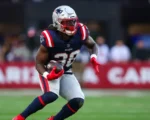CHARLOTTESVILLE, Va. — When Tony Elliott walked into his first team meeting at Virginia in late 2021, he promised to develop the model program, one built on excellence in the classroom and on the field. He did it while looking at a representation of all he and his team would have to overcome: His players were sitting on white plastic folding chairs inside the indoor practice facility, because its outdated football building did not have a meeting room big enough to fit everyone.
Elliott came from Clemson, where the football facility, which opened in 2017, featured everything from a king-sized weight room to an in-house barber shop to state-of-the-art training tables and recovery areas. But when he arrived at Virginia, the facility he inherited had no modern amenities. Every meeting room was too small. There was no nutrition space — meals were handed out of a trailer after practice. No players lounge, either, nor space for support staff. It looked and felt every bit like something from 1991, which is, in fact, the year it was built.
That, however, did not stop Elliott from selling his vision. Forget about the folding chairs. Forget about having no place to eat. Forget about what you thought about Virginia football. This would be a new era. He wholeheartedly believed. So did the players who opted to stay and play for him.
Chandler Morris was knocked out of the game, the Cavaliers are still in the mix in the ACC championship race. They face a must-win game Saturday against Duke (3:30 p.m. ET, ESPN2) and are hopeful Morris will be able to play.
A new $80 million, 93,000-square foot football operations center opened last year, with spacious team meeting rooms and a large dining room featuring a chef who worked at a Michelin-rated restaurant in London. The 14,000-square foot weight room is nearly as large as the old 15,000-square foot facility.
Displayed prominently as you enter the building are the Nos. 1, 15 and 41 jerseys that belonged to Davis, Chandler and Perry, who were shot and killed on a charter bus after returning home from a class field trip to Washington, D.C., three years ago.
When Elliott walks past those jerseys, he thinks about what could have been. Some days he thinks about their funerals. He thinks about their families. He thinks about the lives they should be living.
Elliott thinks about Chandler, who would have been in his sixth season this year, living out everything that was promised on his recruiting visit, celebrating a magical season with his fellow seniors.
He thinks about where Davis and Perry would be in pursuing their post-collegiate dreams, perhaps standing on the sideline in Scott Stadium rooting on their former teammates, maybe storming the field when they beat Florida State in September.
What would they think of their team?
Would they be proud?
In a recent sit-down interview with ESPN, Elliott acknowledged for the first time that he seriously considered retiring after their deaths, unwilling to accept burying three young men, unsure how to lift his team when he had no idea how to lift himself.
«There were days that I wanted to be like, ‘I can’t do it anymore.’ I don’t have to do it,» he says now.
Elliott knew he would be navigating a path no other coach had ever charted: Keeping his promise to build that model program amid unprecedented tragedy. He had unwavering support from the school administration. But more than that, he had its promise to finally invest in Virginia football.
Three years after losing Chandler, Davis and Perry, Elliott is well on his way to delivering on the promises he made.
«It’s a beautiful thing to watch, and it is inspirational,» Virginia athletic director Carla Williams said. «I’m inspired to see how they have shown up every day since the tragedy. It’s very rewarding to see the success, and it just adds to the determination to see it through.»
Noah Josey, Jack Witmer and McKale Boley and defensive tackle Jahmeer Carter — all starters today. In all, 24 players on the 2022 team remain a part of the program.
«A lot of guys maybe thought that we were broken, and thought that it was going to affect us, but it actually brought us together, and it made us even stronger,» Bettridge said. «I want to be known as someone who carried that legacy, and not someone who jumped ship when things got hard. Because hard times don’t last, but strong people do.»
The months passed, and Elliott tried to build a roster, while figuring out his own path forward. Soon, it would be time to return to practice, to establish a new normal. That first day back on the field was hard. But he got the confirmation he needed as he watched his players return to football for the first time in four months when spring practice started the following March.
«If God asked us on the front end: This is what you’re walking into. Do you still want to go through that door? Nobody would sign up for that,» Elliott says. «So, God has to put you in that situation.
«I did choose to come here. When we pray for things, we’ve got to take everything that comes with it, and that’s when I got it. When we got back on the grass, that’s really when it hit me like, ‘All right, this is right where you’re supposed to be.’ Now, get out of your feelings and go focus on what you need to do for everybody else.»
The self-reflection also changed Elliott as a person and as a coach. He says he is more empathetic, a better husband and a better father. After the tragedy, Elliott made sure to open up with his players more. There was no shame in talking about feelings.
«My method of dealing with the things that I dealt with when I was younger, it’s probably not the most healthy and the most productive, but it was what you did,» Elliott said. «You didn’t talk about it much, you just sucked it up and you went through it. But times are different. I’m trying to find that balance of old-school/new-school just to be able to reach and help.»
Nor was there shame in admitting the way he approached his job in Year 1 was simply not going to work.
«When I first came in, young, overzealous, not understanding the job, just trying to do everything so fast, and not really recognizing where everybody else was at, just trying to tell everybody to come meet me where I am,» Elliott said. «I now meet them where they are, and say, ‘Let’s elevate together.'»
ELLIOTT HAD A quote from Hall of Fame coach Bill Walsh placed on the wall in the weight room of the new football facility:
Champions behave like champions before they’re champions; they have a winning standard of performance before they are winners.
At Clemson, Elliott saw a program transform from an underachiever to a perennial national title contender. But he and Williams both knew the fix at Virginia would not be quick; the Cavaliers hadn’t won a conference title since 1995.
Elliott refused to run players off. Anybody on scholarship who has wanted to stay with the program has always been allowed to stay.
There were glimmers of hope in the first couple of years: a ranked win over North Carolina in 2023; another over Pitt in 2024. One-score losses often bled into more losses. Last season felt like Virginia was on the verge of a breakthrough after a 4-1 start, but the Cavaliers finished with losses in six of their final seven games to finish 5-7. Outsiders may have thought that was enough to put Elliott on the hot seat. But Williams never considered making a change. She knew Elliott was trying to do something more difficult than just winning football games.
«When you see people who care deeply showing up every day, when everything around them is pushing them to not show up, for me — that requires patience,» she said. «I understand how difficult it is to focus on a game when you’re traumatized by tragedy.»
All the while, Elliott was helping build a foundation for what was to come. So when offseason workouts began in January, the seniors who had been through the ups and the downs, and the loss of their teammates, took ownership. The transfer players came in and fit in so well that it was hard to tell who had been at Virginia for a few months, and who had been there for a few years.
«Everyone we brought in from the transfer portal, they had the same goal coming here — to win a championship,» said Carter, a sixth-year senior. «I think that showcases the culture change of the program.
«Because maybe a few years ago, you probably wouldn’t have heard that coming from somebody from UVA. Now here we are. That can actually be accomplished.»
The turning point came on a Friday night at home against Florida State. Walking into the stadium, Elliott felt at home, playing in a big national spotlight game, the stakes high. It was just like things were seven years prior at Clemson.
Virginia pulled out a 46-38 double-overtime victory, the fans storming the field almost instantly after the final play ended. Virginia had lost so many close games since he arrived, but Elliott never lost faith that night that his team would win.
Bettridge sat on a bench with his parents and girlfriend and allowed himself a moment to take in the scene.
«It was emotional just to realize what we’ve been through in four years here, and just to see what’s capable, and to know that there’s more,» Bettridge said.
The following week, Virginia played another overtime game, this time beating Louisville thanks to two defensive scores. Elliott texted Perry’s mom, Happy, after the game. «We had a little special help,» he said.
Maybe so. But Virginia is also helping itself this season, making plays when they matter most to pull out three overtime wins, becoming one of only eight teams in college football history with three overtime victories in the same season.
«There’s been teams in the past here that I’ve been a part of that found ways to lose,» Josey said. «This team is different. This team finds ways to win. This team finds ways to grind it out, tooth and nail, whatever it has to be. When we’re in those moments where in past years we might have faltered, we’re not this year. That’s the big difference.»
Now that Virginia has made the investment, there is no turning back. Over the last two months, the school has received one $1 million donation and another anonymous multimillion-dollar commitment.
Says Williams: «You’ve improved the personnel, you’ve improved the operating budget, you’ve improved the facilities. You’ve committed to rev share and NIL. If you stop, then you’ve wasted years of building.»
There is no stopping as far as Elliott is concerned. With each day and each win, there are always reminders about how far they have come, and how much they have lost. Elliott has made it a point to tell all incoming players about Davis, Chandler and Perry.
The three players are honored every year at a home game designated «UVA Strong Day.» This year, on that day, Virginia beat William & Mary 55-16. In his postgame news conference, Elliott noted the 55 points are the most Virginia has scored in a game since a 55-15 rout of Abilene Christian in November 2020. Davis and Perry each scored a touchdown in that game.
Josey thinks about them every time he runs out of the tunnel. He drops to a knee and prays for them and their families. When Bettridge lines up to kick toward the closed side of Scott Stadium, he sees a more permanent reminder: 1-15-41 on the video ribbon board. He uses that as his target point as he lines up to kick, a reminder he is playing for something bigger than himself.
«I’m hopeful that we are bringing joy and hope and a little bit of peace to their families,» Elliott said. «I believe that when we have success, they’re right there with us.»














